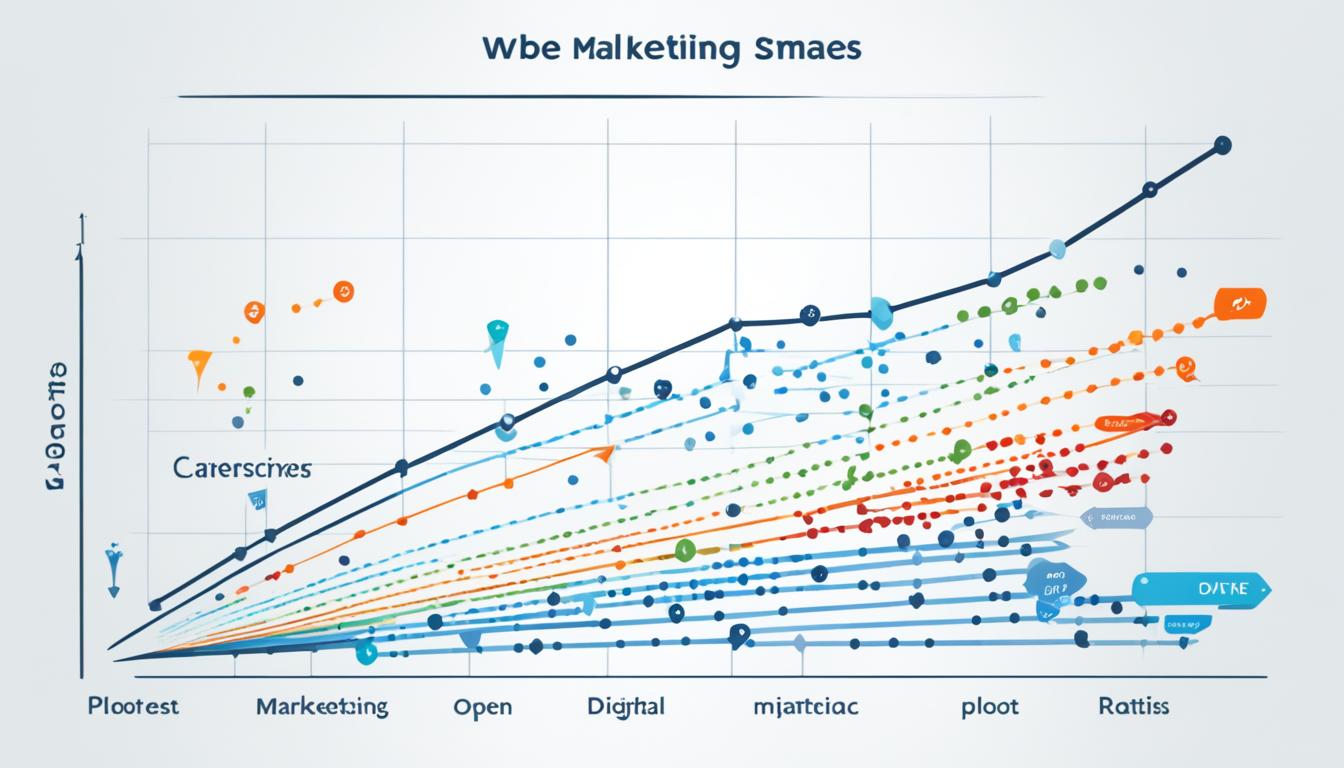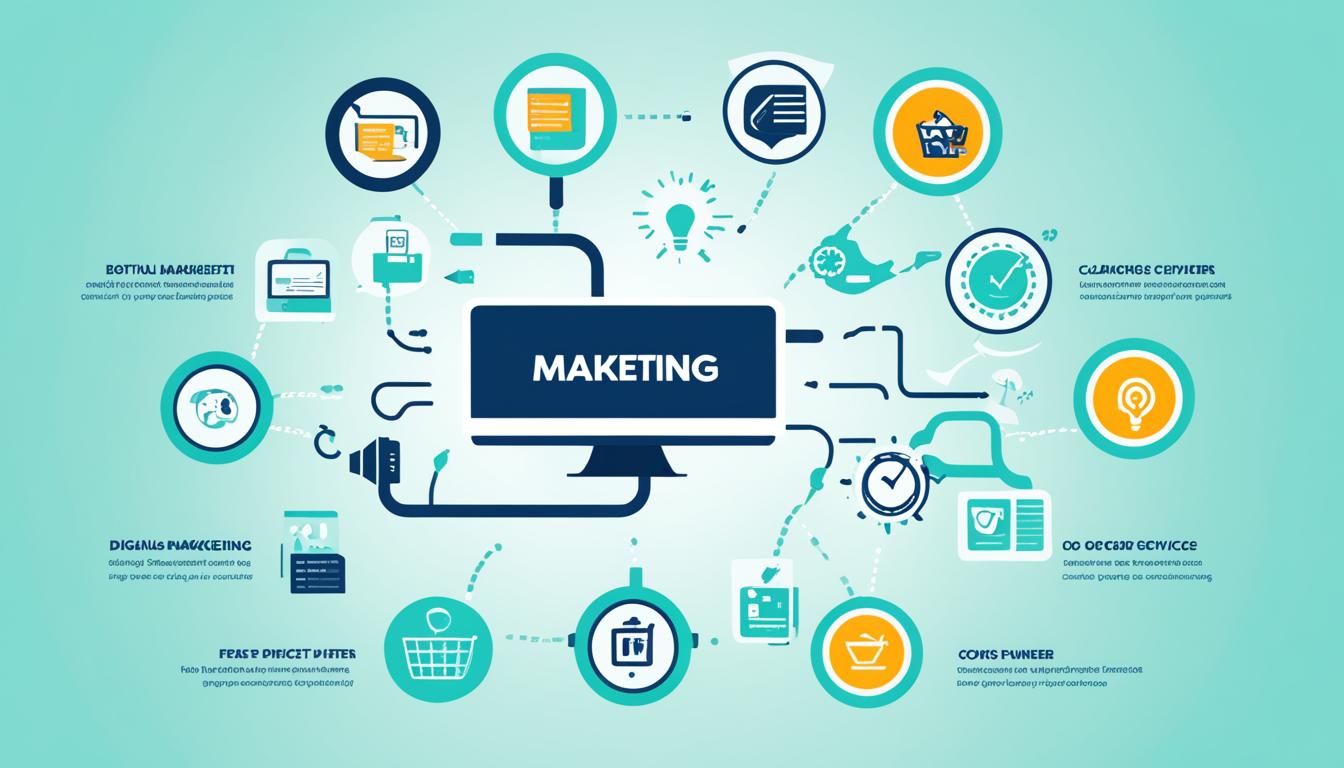Did you know that 72% of digital marketers see creating relevant content as the top SEO tactic? This stat shows how powerful digital marketing is. It suggests that mastering its basics can bring big success, no matter where or what you’re selling.
This guide aims to give beginners the how-tos for success in digital marketing. Getting started doesn’t have to be hard. Once you learn the essentials, you can move on to using more advanced tools. They can really take your business further.
For newcomers in digital marketing, we’ll focus on must-know strategies. These include making a website, growing an email list, and optimizing your content for search engines. We’ll also look at ads and how to attract new people on social media. The idea is to help digital marketing beginners feel ready to build a strong future in digital marketing.
Key Takeaways
- From websites to social media, digital marketing covers a wide range of strategies.
- It’s crucial for beginners to master the basics to shine online.
- Building a website, improving search content, running ads, and connecting with people on social platforms are key strategies.
- A smart, data-focused approach is vital for digital marketing campaigns to succeed.
- Staying curious and keeping up with the latest trends is vital for digital marketing success over time.
Introduction to Digital Marketing
Digital marketing mixes art and science for your brand’s success. It uses digital tools to attract customers and boost sales. This includes making eye-catching websites, growing email lists, and crafting SEO-focused content. It is crucial for businesses to stay relevant in today’s dynamic digital world.
What is Digital Marketing?
Digital marketing is all about promoting products and brands with online tools. It uses a mix of online platforms like SEO, social media, email, and PPC ads. By using these tools, companies can directly connect with people interested in their products. This is different from older ways of advertising.
Benefits of Digital Marketing
Digital marketing opens doors to limitless global audiences at a fraction of traditional marketing costs. It allows personalizing messages and targeting specific groups. With digital methods, tracking and fine-tuning marketing campaigns is easier. This leads to higher brand visibility, more leads, and better customer information for smarter business choices.
Importance of Digital Marketing for Beginners
Digital marketing offers a more affordable and measurable way for newcomers, especially for small businesses and entrepreneurs. It’s both compelling and challenging. By learning the basics, you can build a solid online presence from scratch. This prepares you for growing your business in the digital age.
Understanding Your Target Audience
Knowing your target audience is key to successful digital marketing methods. Through detailed market research and creating buyer personas, you learn what they need. This helps shape your content, ads, and marketing strategy.
Conducting Market Research
Market research starts by talking to your current customers. It’s about finding out what they like and need. Then, you make profiles called buyer personas to represent your ideal customer.
For instance, Nike targets athletes and sports lovers. Tools like social media insights and Google Analytics can help identify your audience’s interests and buying habits.
Creating Buyer Personas
Creating buyer personas is very important. This step helps you know who your customers are in detail. Companies like Lightlife Foods and Apple Music have found success this way. By deeply understanding your ideal customers’ needs and wishes, you can make content that appeals to them.
Mapping Customer Journeys
Mapping out the customer journey shows you what steps lead them to buy. It’s about figuring out where and when they are most interested in your content. By analyzing social media and website data, you can understand when they are ready to buy. This way, you can improve their buying experience and your sales.
| Audience Insights | Key Data Points |
|---|---|
| Demographics |
|
| Psychographics |
|
| Engagement |
|
Content Marketing Strategies
Content marketing is vital for online success. Search engines favor content that’s interesting, up-to-date, and adds value. It can be in the form of blog posts, videos, infographics, and more. All these help reach new customers or keep current ones engaged.
Creating Compelling Content
It’s key to pick topics and styles that your readers will love. Using the same content in different ways and sticking to your brand’s look and feel also make it more appealing. This can draw more people in and convey your message effectively.
Types of Content
You can use many types of content to market, like blog posts, videos, or podcasts. Mixing these up attracts a broader crowd. It also makes your efforts more visible and impactful.
Content Creation Tips
To win over your audience, focus on content that truly benefits them. Set clear goals, figure out who you’re trying to reach, and solve their problems. Make your content informative and eye-catching. Finally, use data to improve as you go.
| Key Content Marketing Statistics | Value |
|---|---|
| Percentage of companies using content marketing | 29% (according to 2024 HubSpot research) |
| Consumers who prefer to learn about a product/service via an article rather than an ad | 70% (according to the Content Marketing Institute) |
| Lead generation potential of content marketing vs. outbound marketing | Over 3 times more leads, at 62% less cost on average (according to Demand Metric) |
| B2B marketers who say content marketing is an effective lead generation strategy | 67% |
| Buyers who consume 3-5 pieces of content before engaging with a vendor | 44% |
Search Engine Optimization (SEO)
Search engine optimization (SEO) helps boost a website’s visibility and ranking in search engine results. On-page SEO makes sure a website’s content and structure are search-friendly. It involves creating high-quality content, using the right keywords, and making the site fast and mobile-ready.
Off-page SEO deals with outside influences. This includes getting respected websites to link back to yours. Doing this through guest posts or studies can make your website more credible and rank higher in searches.
Keyword Research
Key keyword research finds what your audience is searching for. Using tools like the Keyword Magic Tool helps marketers find relevant search terms. Using these terms in titles and content can make your website more visible in search results.
| SEO Tactic | Description | Impact |
|---|---|---|
| On-Page SEO | Optimizing website content, technical infrastructure, and user experience to appeal to search engines | Improves a website’s visibility and rankings in search results, driving more qualified traffic |
| Off-Page SEO | Building a strong backlink profile through tactics like guest posting and industry partnerships | Boosts a website’s credibility and authority, further enhancing search engine rankings |
| Keyword Research | Identifying the terms and phrases your target audience is searching for | Allows you to create content and optimize website elements around the right keywords for maximum visibility |
SEO strategies can help marketers bring more relevant traffic to their websites. This traffic can turn into sales and leads, benefiting them greatly.
Social Media Marketing
Social media marketing combines organic and paid methods to reach your audience. The first step is picking the right platforms. These are chosen based on where your customers are online.
Having a presence on social media is key, as over half the world’s folks use it. Choices range from Facebook to Twitter. Making these decisions requires careful market research.
Choosing the Right Platforms
With over half the world’s population on social media today, having a presence is vital. Businesses must find their customers on these platforms. They can be anywhere from Facebook and Instagram to LinkedIn and Twitter.
The best platform for your business is found through deep market research. Knowing your audience’s social media habits helps in making this choice.
Organic Social Media Marketing
Organic marketing requires consistent, quality content to maintain a strong brand image. When posting regularly, make sure your content is engaging and informative.
Small businesses should focus on quality over quantity when starting out. Use diverse content like GIFs and videos. This, along with storytelling, can connect with your audience.
Paid Social Media Advertising
Paid advertising lets you target specific demographics and expand your reach. It can drive actions on your website, such as more visits and sales. With a global penetration rate of 57%, combining organic and paid methods boosts your visibility.
Evaluating your ads’ performance is vital. This helps in tweaking your strategies for better results. Making decisions based on social media metrics is important for success.
Email Marketing
Email marketing is still a top way for businesses to connect with people. By getting into their emails, you can reach them directly. To do this, you need a good list of emails, which you can get by using different tactics on your website and other places. Tools for email automation help you send personalized emails to all on your list easily.
Building an Email List
For your email marketing to work well, you need a strong email list. You can get people to sign up by offering something valuable on your site and through social media. Make sure you keep them interested with good content and offers to lower the number of people who leave your list.
Email Automation
Using email automation allows you to send right-on-time, personalized emails to lots of people. You can group your email list by things like age and interests. Then, you can send emails that feel like they’re just for that one person. For example, send out welcome emails to new subscribers or reminders for abandoned items to help lead them back to your website. This can help your business connect better with your audience and increase sales.
A/B Testing for Email Campaigns
A/B testing is key to making your email marketing the best it can be. Try out different emails and see what gets the best response from your readers. Pay close attention to stats like who opens the email and who clicks on things. This info can help you make your email strategies even better over time.
Strategic email marketing can really grow your business. By focusing on building a good list, using email automation, and testing out different emails, you can make the most of this digital marketing tool.
Practical Tips for Beginners
Just starting out in digital marketing might seem scary. But, focusing on what you’re good at can make things clearer. Start by mastering a few key areas before learning more broadly. Doing freelance work or part-time jobs helps apply what you’ve learned.
Keep educating yourself with online courses, industry blogs, and podcasts. Networking is also key to staying current on the latest trends. By building your skills step by step, a great career in digital marketing is within reach.
Pay-Per-Click (PPC) Advertising
Search engine marketing, or PPC advertising, puts ads on top search engines. For example, Google and Bing show these ads. When users look for something related, your ad might show first. This brings more people straight to your website. Using Google Ads and Bing Ads, you can aim your ads at specific groups. This includes people’s interests and what they need.
Google Ads
Google Ads helps businesses reach potential customers. It costs around $2 each time someone clicks on your ad. This makes it a great way to get leads and boost sales. Businesses use smart targeting and bidding to make the most of Google’s big reach.
Bing Ads
Bing Ads can also work well for businesses, especially on certain searches. It can cost less than Google—about $1.86 per click. This is good news for companies looking to spend less but still reach their audience.
PPC Campaign Management
Running successful PPC ads takes careful work. It’s about always making ads better, testing what works, and looking at numbers. With data, marketers can keep making their PPC strategy better. This way, they can earn more from what they spend.
Analytics and Tracking
Digital marketing analytics help measure a marketing campaign’s success. They look at website traffic, user actions, and ROI. Google Analytics helps with data on website visitors and their behavior. Social media analytics from Facebook and Twitter give similar insights for social media.
Digital marketers use this data to check KPIs and aim for better conversion rate optimization. This means making choices based on data to improve a campaign. Knowing how to use analytics well is a key skill in digital marketing.
Google Analytics
Google Analytics gives a lot of data for making smart decisions in marketing. It tracks website visitors, their behavior, and how well your campaigns perform. This tool offers a deep look at your online efforts.
Social Media Analytics
Monitoring social media channels is also crucial. Tools like Facebook Insights and Twitter Analytics show details on your posts’ reach and engagement. By reviewing this information, you can make your social media strategy better and aim at the right audience.
Conversion Rate Optimization
Conversion rate optimization improves how many website visitors complete a goal. By using digital marketing analytics and testing things like website design, you can find ways to get more actions. This ultimately enhances the user experience and results in more success.
| Metric | Description | Importance |
|---|---|---|
| Pageviews | The total number of pages viewed on your website. | Indicates overall website traffic and engagement. |
| Unique Pageviews | The number of sessions during which a particular page was viewed at least once. | Provides a more accurate representation of unique visitors. |
| Sessions | The number of times users interact with your website. | Helps measure user engagement and website activity. |
| Bounce Rate | The percentage of visitors who leave your website after viewing only one page. | Can indicate issues with user experience or content relevance. |
| Conversions | The number of visitors who complete a desired action, such as making a purchase or filling out a form. | Directly measures the success of your digital marketing efforts. |
Integrating Digital Marketing Channels
To make your digital marketing work well, it’s key to use integrated, omnichannel approach. This means creating a comprehensive digital marketing strategy that covers your website, social media, email, pay-per-click (PPC) ads, and more. Keeping brand consistency in what you write, share, and how you interact with customers across all points is vital. It builds trust and helps your audience recognize your brand.
Using customer relationship management (CRM) tools is also essential. They help digital marketers keep in touch with leads, keep customers, and make them more loyal. With a smart, data-based approach to integrating digital marketing channels, companies can get noticed more, interact better, and get a bigger return on their marketing investments.
Developing a Comprehensive Strategy
It’s vital that all marketing teams work together. If not, you risk creating a mess with two teams going in different directions. They need to have the same goals for your online marketing to work well together. It’s important to track how well your marketing strategies are doing. This can be done with tools like Google Analytics or special software made for tracking marketing success.
Maintaining Brand Consistency
Sharing the same brand voice everywhere helps get to new customers. Having good communication and working together are big parts of getting all your marketing teams on the same page. It’s a good idea to reuse content in different places. This keeps your message and brand consistent.
Customer Relationship Management (CRM)
Using CRM tools is great for keeping up with leads, keeping customers happy, and making them more loyal. Whenever you run a campaign, make sure to collect leads. Even if it’s just to get your brand out there, this step is crucial. Knowing your audience well by each marketing channel helps your marketing be more focused. Having managers for each channel in your campaign helps it all run smoothly.
| Key Integrated Marketing Metrics | Typical Benchmark | Top Performing Brands |
|---|---|---|
| Website Traffic Growth (MoM) | 5% | Southwest Airlines |
| Engagement Rate (Likes, Comments, Shares) | 2-5% | Southwest Airlines |
| Conversion Rate (Leads, Sales) | 1-3% | Southwest Airlines |
| Customer Retention Rate | 70-90% | Southwest Airlines |
Staying Up-to-Date with Digital Marketing Trends
Keeping up with digital marketing is key to its success. It’s always changing, with new tools and ways of doing things quickly popping up. To do well, workers in this field need to keep learning and growing.
Following Industry Blogs and Podcasts
Reading blogs and listening to podcasts helps you know the latest trends. Places like Marketing Land, The Digital Marketing Institute, and Moz are great for learning. They talk about SEO, social media, and much more. Subscribing to them keeps you up to date and helps you learn new strategies for your work.
Attending Conferences and Webinars
Going to events is also very helpful. Both in-person and online, they allow you to learn from the best and meet others like you. For example, big events like Social Media Marketing World and Content Marketing World have lots of classes and chances to meet new people. Webinars from WebFX can give you quick tips that are useful right away.
Continuous Learning and Upskilling
Professionals should always be looking to improve. This means taking online classes, getting certifications, or doing training. For instance, the Digital Marketing Certificate at the University of South Florida is a great option. By continuing to learn and grow, digital marketers can keep their edge in the industry.
Digital marketing is always changing. The way to keep up is by leaning into growth and always learning. By reading up, attending events, and constantly improving, digital marketing pros can do well in this exciting field.
Measuring Success and ROI
Measuring digital marketing success is key for fine-tuning performance and showing your impact. Key performance indicators (KPIs) such as website visits and sales revenue help gauge success. They let us see what’s working well and what’s not.
Key Performance Indicators (KPIs)
Defining Key Performance Indicators (KPIs) makes it easier to track how well marketing is doing. KPIs might be the number of people on your mailing list or social media, event attendees, or sales calls. They also include things like how often your brand is mentioned online, or the number of clicks on your website.
Return on Investment (ROI) Calculation
Finding ROI means taking your profit, dividing by the cost, and multiplying by 100. Marketing ROI usually aims for a 5:1 ratio, where every dollar spent brings in five dollars. An ROI over 10:1 is excellent, while under 2:1 means you’re likely not profiting.
Adjusting Strategies Based on Results
It’s vital to keep checking data, trying new things, and adjusting as needed to boost your marketing’s success. ROI analysis is crucial because it offers insights into what works and what doesn’t. It helps choose the best advertising, evaluate longer-term outcomes, plan your budget, and keeps the innovation alive. Setting clear goals and linking them to your marketing and business aims helps improve strategies and get better outcomes.
Conclusion
Digital marketing offers a way for new people to make their mark online. With the right skills and knowledge, beginners can see real growth in their business. Starting with the basics, like who you’re trying to reach and how to get there, is key.
With hard work, thinking outside the box, and using data for decisions, anyone can build a successful career in digital marketing. This final part of the guide is a chance to review what you’ve learned and put it into action. Remember, knowing your audience well and creating content that stands out is crucial. Also, using search engines right and mixing different online tactics can really make a difference.
Because the digital world keeps changing, it’s important to keep learning and adapting. By staying curious and consistently improving your skills, you can stay ahead in the evolving digital marketing field.
FAQ
What is digital marketing?
Digital marketing uses online tools to boost sales and interest in what you offer. This includes things like making a website, growing your email contacts, and making sure your content pops up in search results. You can advertise on Google or Bing, and connect with new people on social media.
What are the benefits of digital marketing?
Digital marketing lets you reach people all around the world. It helps you show the right message to the right people, making your efforts more efficient. You can also learn a lot from the data you gather, helping you make smart moves for the future.
Why is digital marketing important for beginners?
It’s a good starting point because it’s cheaper than traditional ads. With digital marketing, beginners can get their business known online. They can learn tools that will help them grow over time.
How can I understand my target audience?
Knowing who you want to reach is the first big step. Ask your current customers what they’re interested in and what they need. This info helps you make profiles that represent your audience and plan how to reach them.
What is content marketing, and why is it important?
Content marketing means creating stuff that people find interesting or useful. Search engines like Google and Bing rank this kind of content higher. By making valuable content, you can catch the eye of your customers.
What is search engine optimization (SEO), and how does it work?
SEO is getting your website to show up higher in search results. You need to use keywords that people search for and have a good strategy. This way, you get more of the right visitors who could become your customers.
How can I use social media marketing effectively?
Use both free and paid ways to connect with your audience on social media. Pick the platforms where your audience hangs out. Combining different social media strategies can boost your visibility and engagement.
What are the key components of email marketing?
Email is still a great way to talk to customers. Build a good email list and send messages that stand out. Test what works best to improve how your emails do.
What practical tips can you share for digital marketing beginners?
Start by finding what you’re good at and interested in. Learn a few key areas well before moving on to others. Keep learning and gaining experience step by step to succeed in digital marketing.
What is pay-per-click (PPC) advertising, and how does it work?
PPC ads show up in search results like Google. To do it well, you need to keep improving your ads and analyzing the results. This way, you can get more leads and sales cost-effectively.
How can I measure the success and ROI of my digital marketing efforts?
You need to track key numbers like website visitors and how many of them become customers. Be ready to try new things and adjust based on what you learn. Keeping an eye on these metrics lets you know how well your digital marketing is doing.
How can I stay up-to-date with the latest digital marketing trends and best practices?
Always keep learning – read blogs, listen to podcasts, and follow the news. Attending events and online webinars can also keep you up-to-date and give you chances to learn from the best.
How can I integrate my digital marketing channels for maximum impact?
Making all your digital channels work together is key. They should all follow the same plan and show a consistent message. Using a CRM system can also help you keep track of leads and customer relationships with your brand.
Source Links
- https://rockcontent.com/blog/basics-of-digital-marketing/
- https://www.singlegrain.com/blog/ms/learn-digital-marketing/
- https://www.simplilearn.com/tutorials/digital-marketing-tutorial
- https://sproutsocial.com/insights/target-audience/
- https://blog.hubspot.com/marketing/target-audience
- https://www.adroll.com/blog/5-tools-to-learn-about-your-target-audience
- https://www.outbrain.com/blog/8-priceless-content-marketing-tips-and-strategies/
- https://blog.hubspot.com/marketing/content-marketing-tips
- https://blog.hubspot.com/marketing/content-marketing
- https://developers.google.com/search/docs/fundamentals/seo-starter-guide
- https://backlinko.com/actionable-seo-tips
- https://www.semrush.com/blog/seo-tips/
- https://www.bu.edu/prlab/2022/03/01/5-tips-to-successful-social-media-marketing/
- https://www.socialpilot.co/blog/social-media-marketing-tips
- https://www.campaignmonitor.com/resources/infographics/11-pro-email-marketing-tips/
- https://blog.hubspot.com/marketing/make-emails-more-clickable-list
- https://blog.hubspot.com/marketing/email-marketing-guide
- https://www.smashingmagazine.com/2023/05/practical-design-tips-guidelines-beginner-designers/
- https://rethinkrural.raydientplaces.com/blog/5-practical-tips-on-prepping-for-beginners
- https://www.forbes.com/advisor/business/ppc-marketing-guide/
- https://blog.hubspot.com/marketing/ppc
- https://piwik.pro/blog/analytics-implementation-in-12-steps-an-exhaustive-guide-tracking-plan-included/
- https://www.klientboost.com/analytics/google-analytics-tips/
- https://www.fullstory.com/website-analytics/
- https://www.webfx.com/digital-marketing/learn/how-to-take-an-integrated-approach-to-digital-marketing/
- https://blog.hubspot.com/marketing/integrated-marketing
- https://www.digitalmarketer.com/blog/marketing-trends-for-digital-marketers/
- https://www.webfx.com/blog/marketing/how-to-keep-up-with-marketing-trends/
- https://www.bannerflow.com/blog/measuring-marketing-roi-calculate-success
- https://www.benchmarkemail.com/blog/measuring-marketing-roi/
- https://www.forbes.com/sites/forbesagencycouncil/2020/02/28/measuring-marketing-roi-13-simple-and-effective-strategies/
- https://writingcenter.unc.edu/tips-and-tools/conclusions/
- https://proofed.com/writing-tips/the-dos-and-donts-of-writing-a-dissertation-conclusion/

















